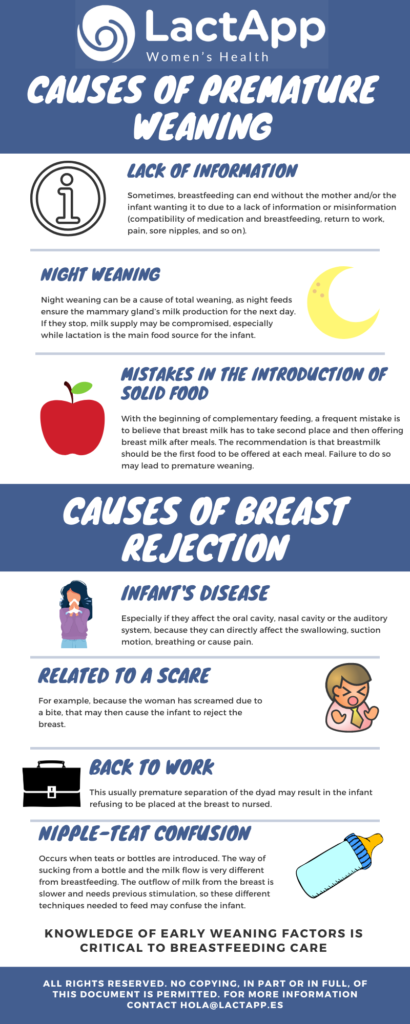
Causes of premature weaning
Premature weaning can have different definitions depending on the point of view from which it is approached.
From a public health point of view, international organizations such as the WHO emphasize the recommendation to maintain exclusive breastfeeding for 6 months and up to 2 years of age or until the mother and infant desire.
We refer to premature weaning when breastfeeding stops, but the mother did not wish nor want to do so.
According to Ballesta et al., in Spain, up to 97% of pregnant women make the decision to breastfeed the expected child when they are pregnant (1), and those rates are similarly high across the world.
The factors with the most significant impact on the duration of breastfeeding are the mother’s return to paid work and the sensation of hypogalactia or that the newborn is hungry (45,47). On the other hand, according to Rius, JM et al. (2), if a mother feels she has enough milk supply, this is a protective factor against the early cessation of breastfeeding.
In the consultation room of a lactation consultant, we often come across situations that put breastfeeding at risk and are the cause of premature termination of breastfeeding.
The physiology of breastfeeding is little known, both by the general population and by healthcare professionals, so this lack of information can easily lead to a series of actions that make breastfeeding difficult, leading to involuntary weaning.
On the other hand, attention to breastfeeding difficulties is often carried out poorly. This prolongs the processes of pain during the feed or problems with milk transfer, which are the two factors that could put the continuity of breastfeeding at greater risk during the first days of lactation.
The following infographic summarizes the main factors we can encounter in consultation.

Knowing the causes of premature weaning can help us diagnose it correctly and consequently address it better.
References
- Ballesta-Castillejos A, Gómez-Salgado J, Rodríguez-Almagro J, Ortiz-Esquinas I, Hernández-Martínez A. Factors that influence mothers’ prenatal decision to breastfeed in Spain. Int Breastfeed J. 2020 Dec 1;15(1).
- Rius JM, Ortuño J, Rivas C, Maravall M, Calzado MA, López A, et al. Factors associated with early weaning in a Spanish region. An Pediatr (Barc) [Internet]. 2014 [cited 2022 Dec 18];80(1):6–15. Available from: https://pubmed.ncbi.nlm.nih.gov/24090521/